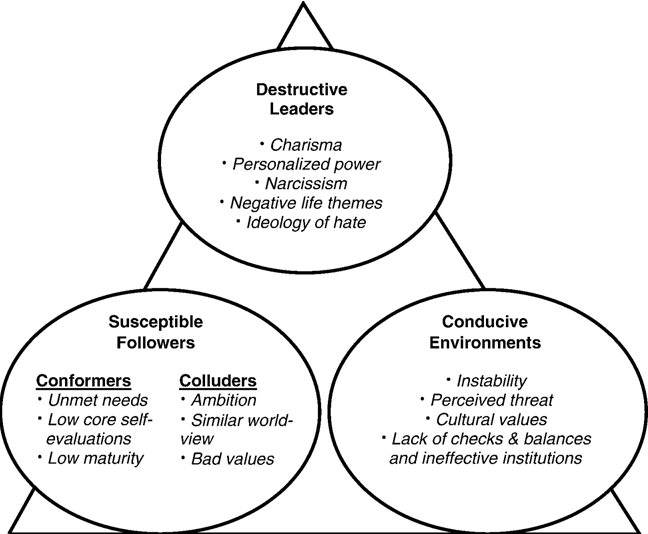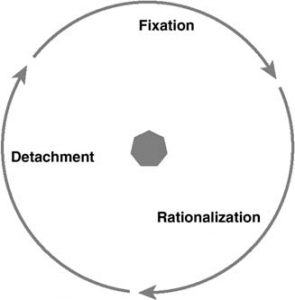Scandals. Fraud. Abuse of power. Greed. Corruption. Tax evasion. Coverups.
Once rare occurrences, coming back to haunt us every decade or so, these are now front and center in our daily lives and our daily news cycle. We see them in government, in business, and even in nonprofits and some religious organizations.
It seems as if we are in a race to the bottom.
While these challenges and failings have always been with us, we are not particularly well equipped to deal with them, in part because we fail to understand their root causes—and to hack away at them.
Three Symptoms of Ethical Hazard
Enter Professor Kenneth Goodpaster and what he calls the “three symptoms of ethical hazard”:*
1. Fixation:
obsession with an overarching goal. For example, Enron executives were a group of hyper-ambitious overachievers with something to prove about being number one. Many were ruthless and uninhibited about doing whatever it took to get there. For NASA, it was fixation with set-in-stone space shuttle launch dates, contributing to tragic explosions and loss of life. Some mountain climbers get “summit fever,” where they are so focused on reaching the top that they recklessly risk their own lives and those of their teams.
2. Rationalization:
attempting to explain or justify behavior with logical reasons, even when not appropriate. Sometimes values conflict (e.g., truth vs. loyalty). Rationalization entails choosing based on one “privileged feature” (e.g., total loyalty regardless of the truth). This creates “blind spots” in ethical thinking. Examples of rationalization are legion:
- My boss told me to do it.
- Everybody else is doing it.
- It’s just this one time.
- No one will find out.
- It’s not my responsibility.
- It’s not lying. (It’s just not telling the truth.)
- We really need/deserve this.
- I didn’t do anything. (I just looked the other way.)
- You don’t understand the pressure we’re under.
- “Business is business”: we’re just “maximizing shareholder value.”
- “Politics is dirty”: we have to do this so we can do X, Y, Z….
“I… rationalized that what I was doing was OK, that it wasn’t going to hurt anybody.” /
“I will live with this pain, with this torment, for the rest of my life.”
–Bernie Madoff, former financier and operator of a Ponzi scheme
considered the largest financial fraud in U.S. history
3. Detachment:
the sense of not being personally involved in something or of having no interest or stake. On ethical matters, Goodpaster raises the alarm when our actions are detached from our personal values. When detached, people bypass their heart and soul as they privilege only their head, and they anesthetize their humanity in the face of temptations to win or be perceived as successful. Here he draws on psychoanalyst and author Michael Maccoby, who warned that “careerism” was a self-destructive affliction suffered by many successful executives (and politicians, presumably), fueled by an obsession with winning and a “gamesman” view of all actions in terms of whether they will help you succeed in your career or campaign. The person detaches from his or her sense of identity (e.g., as a mother or father, citizen, etc.) and integrity, and one’s sense of self-worth becomes measured by performance in the market, game, or arena. Such detachment corrodes character and degrades mental health, with people leading divided lives between work and home.
Ethical Fading and Moral Disengagement
Two related dangers here are “ethical fading” and “moral disengagement”:
- Ethical fading: “when the ethical aspects of a decision disappear from view,” such as when people focus so much on things like profitability or winning that they do not register unethical and illegal behavior (and the related aspects of harm, pain, conflict).
- Moral disengagement: restructuring reality to make our actions seem less harmful than they are, convincing ourselves that ethical standards do not apply to us in a certain context, such as a political campaign. We mentally reframe destructive behavior as acceptable, and our brains are masterful at this misdirection.
Each one of these three symptoms is dangerous, but the real problem is that they converge into a single, terrible pattern. Goodpaster calls this “teleopathy”: the unbalanced pursuit of purpose. The word “teleopathy” combines two Greek roots: “teleo”: goal, target, or purpose; and “pathos”: disease or sickness.
We can think of it as a goal sickness—as being so focused on a goal that we pursue it destructively. Here’s the rationale:
We must win….
And we must be the best…
We must rule.
Antidotes for Ethical Hazard
Thankfully, Goodpaster notes that there are “antidotes” for the three symptoms of ethical hazard:
1. From fixation to perspective.
We must see that our goals are part of a larger mission, the common good. We need to transcend our perpetual busyness and reactivity and build in reflection time, renewal rituals, and sanctuary. Without a larger and longer term perspective of community, duty, stewardship, and sustainability, we will spiral down in self-destructive patterns.
2. From rationalization to frankness.
Since our rationalizations tend to be subconscious, coming from the older and faster parts of our brain that do not engage our most advanced reasoning capacities in our prefrontal cortex, we need radical honesty and candor through searching and piercing dialogue and healthy conflict with colleagues who recognize the tremendous value of vetting and pressure-testing our ideas and decisions and inviting conversations about whether we are upholding our shared values. We need people who are willing to “speak truth to power,” even when they are a voice of one. Ideally, our organizational culture fosters such questioning and conflict, all in service of making wise decisions and proper actions.
3. From detachment to engagement.
This requires engaging our heart as well as our head. A powerful way to do that is to be clear about the higher purpose of the work you are doing (beyond winning a campaign or maximizing profits:
- What will you do once elected?
- What value can you create for all stakeholders through the profits you generate?
- What positive impact can you have via serving others, and are you doing your part for the common good?
Now more than ever we need to identify and hack away at the root causes of our ethical failings and political dysfunction. We need to stop our senseless race to the bottom—in business with our myopic pursuit of profit and growth regardless of the consequences on people and planet, and in politics with our zero-sum game mentality of “I must win and you must lose” with all its attendant cynicism and disdain for fellow citizens who happen to disagree with us on some issues. We need to look for shared values and mutual interests instead of stoking mistrust, anger, and resentment. This race to the bottom is so dangerous because it threatens to destroy the very foundations of our communities and society. With perspective, frankness, engagement, and a healthy pursuit of shared purpose, we can redirect the race upward.
* Source: Kenneth Goodpaster, “Ethics or Excellence? Conscience as a Check on the Unbalanced Pursuit of Organizational Goals,” Ivey Business Journal, March/April 2004.
Tools for You
- Traps Test (Common Traps of Living) to help you identify what’s getting in the way of your happiness and quality of life
- Quality of Life Assessment to help you discover your strongest areas and the areas that need work and then act accordingly
- Personal Values Exercise to help you clarify what’s most important to you
Related Articles
- “What Followers Can Do about Bad Leaders“
- “Business Ethics: How Are Today’s Companies Doing?“
- “The Most Important Questions for Leaders“
- “Toxic Leaders, Susceptible Followers“
- “BAD Leadership: 7 Types“
- “The Trump Leadership Playbook–And Why It Matters“
++++++++++++++++++++++++++++++
Gregg Vanourek is a writer, teacher, & TEDx speaker on personal development and leadership. He is co-author of three books, including LIFE Entrepreneurs: Ordinary People Creating Extraordinary Lives (a manifesto for living with purpose & passion) and Triple Crown Leadership: Building Excellent, Ethical, and Enduring Organizations (a winner of the International Book Awards). Check out his Best Articles or get his monthly newsletter. If you found value in this article, please forward it to a friend. Every little bit helps!








